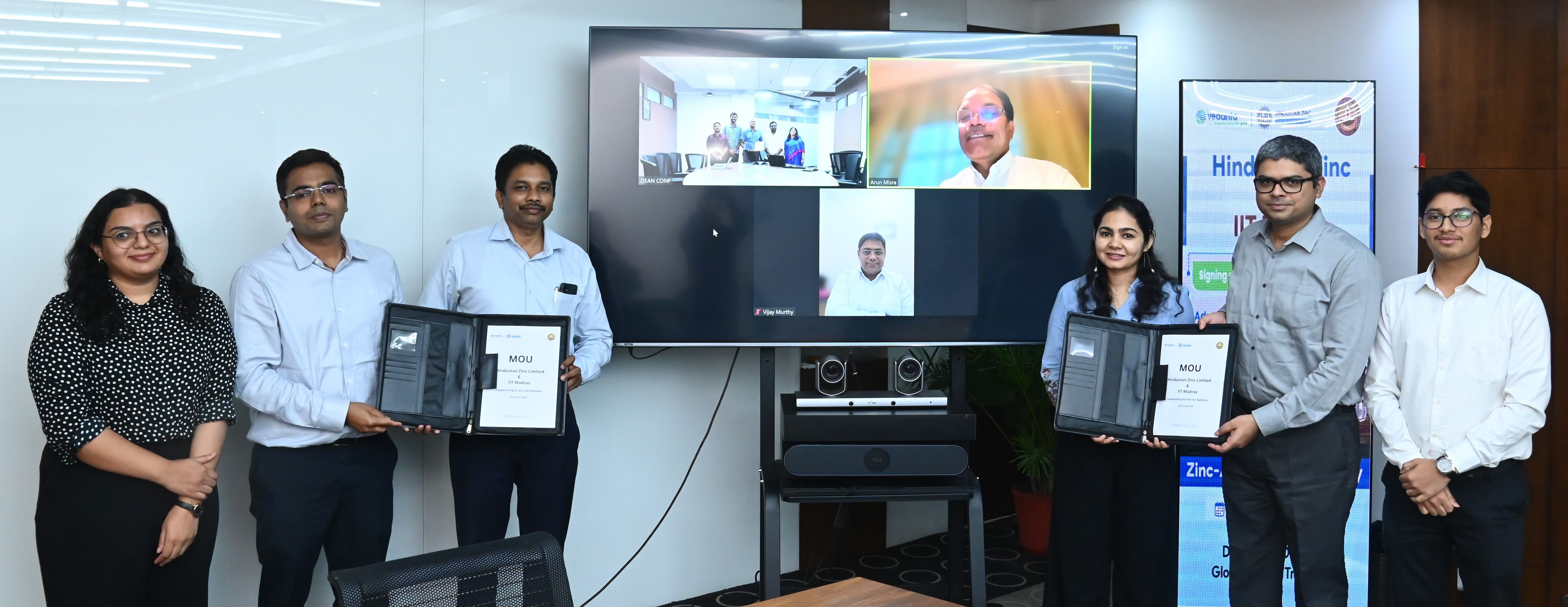IIT Madras partners Hindustan Zinc to develop advanced zinc-air battery tech
The collaboration aims to develop a 1 kWh electrically rechargeable zinc-air battery prototype; zinc-air batteries offer a cost-effective, rechargeable and durable alternative to lithium-ion batteries.
The Indian Institute of Technology Madras (IIT Madras) and Hindustan Zinc, India’s largest and the world’s second-largest integrated zinc producer, have signed a Memorandum of Understanding (MoU) to develop a ground breaking 1 kWh electrically-rechargeable zinc-air battery prototype.
This partnership marks a significant step forward in the evolution of zinc-based battery technologies, leveraging zinc's abundant resource availability, cost-effectiveness and established safety record. While lithium-ion batteries currently dominate the EV market, their high cost, limited resource availability and safety concerns present major challenges that zinc-based alternatives can effectively address.
Speaking about this collaboration, Arun Misra, CEO, Hindustan Zinc, said: “Zinc, a critical metal across numerous industries, is set to play a crucial role in the global energy transition. Our metal offers a sustainable and economically viable alternative to lithium in energy storage technology. Our partnership with IIT Madras will advance research on zinc-air battery technology, that will redefine the future of energy storage. By exploring new applications of zinc in energy storage, we are committed to contributing to a greener and more sustainable future for the generations to come.”
Leading the research team from IIT Madras, Prof. Aravind Kumar Chandiran, Head of Hyundai Hydrogen Innovation Hub, IIT Madras, brings extensive expertise in energy storage solutions like solar cells and zinc-air batteries. His research team has already developed a prototype rechargeable zinc-air battery and holds three Indian patents for innovations in leak resistance, anode recharging and anode replacement design. This collaboration aims to enhance energy storage systems, with potential applications in renewable energy, data centers and telecommunications.
Highlighting the expected outcomes, Prof. Aravind Kumar Chandiran, who is also a faculty in the Department of Chemical Engineering, IIT Madras, said, "Zinc-air batteries offer a promising solution for overcoming the challenges faced by current energy storage technologies. Our partnership with Hindustan Zinc allows us to leverage our expertise in zinc-air battery research and their industry leadership in metals to develop innovative solutions that act as significant energy storage systems for EVs and stationary storage systems. The successful development of this prototype will accelerate India’s capabilities in advanced battery technologies and pave the way for further innovations in the field.”
Zinc-Air batteries are emerging as a viable alternative, known for their long-duration storage capabilities, durability and potential to be a more affordable alternative to lithium-ion batteries. Compared to lithium, which is over four times more expensive, zinc offers a more affordable solution with superior performance attributes.
According to Hindustan Zinc, this battery technology is much more stable than lithium-ion chemistry and safe for vehicles since it utilizes water-based electrolytes and no flammables. Zinc-air batteries offer longer life cycle and operate at low power with higher energy efficiency compared to lithium-ion batteries.
Earlier research in zinc-air battery technology by IIT Madras has yielded remarkable results which has addressed the shortcomings of lithium-ion batteries the market is currently grappling with, so far. Unlike the replacement of whole battery packs in the case of lithium-ion batteries, used zinc battery cassette packs can be removed and replaced with fully charged ones thereby adding rechargeability to the list of advantages. Zinc-Air batteries signify a tremendous leap in the energy storage segment for being green and economical.
This MoU with IIT Madras complements Hindustan Zinc's ongoing efforts in the battery storage space. Recently, the company signed an MoU with Jawaharlal Nehru Centre for Advanced Scientific Research (JNCASR) to develop next-generation zinc-ion batteries. Prior to that, Hindustan Zinc partnered with AEsir Technologies, Inc., a US-based company specializing in next-generation nickel-zinc battery technologies.
RELATED ARTICLES
Rajiv Bajaj reappointed MD and CEO of Bajaj Auto for five-year term
Bajaj Auto’s Board of Directors has approved the re-appointment of Rajiv Bajaj as the company’s MD and CEO for another f...
JSW MG Motor launches Comet EV Blackstorm edition
The key highlights of the Comet EV Blackstorm, which is now the top-end variant, are its ‘Starry Black’ exterior along w...
Maruti Suzuki begins production at new Kharkhoda plant
Phase 1 of the Kharkhoda plant will have an annual production capacity of 250,000 units and produce the Brezza compact S...






 By Autocar Professional Bureau
By Autocar Professional Bureau
 10 Oct 2024
10 Oct 2024
 7688 Views
7688 Views









 Ajit Dalvi
Ajit Dalvi

